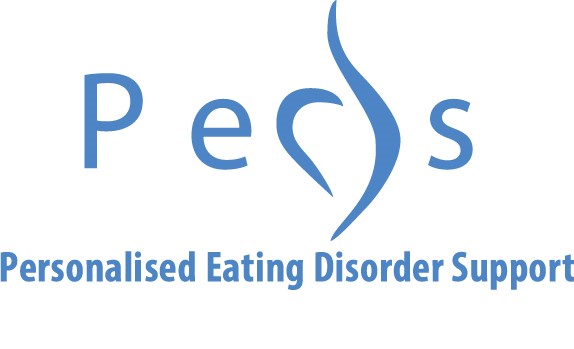What are Eating Disorders
“Eating disorders are biologically based, serious mental illnesses and are fully treatable with a combination of nutritional, medical, and therapeutic support – the sooner someone gets the treatment they need, the better the chance of a good recovery. They are NOT choices, passing fads or phases”.
School Nursing Toolkit, SAPHNA 2022
Eating disorders are not all about food, they are largely about feelings. The person often uses food as a symbol to express how they are feeling, and it can help them assert a sense of control over their life. They are multifaceted and can be caused by several factors.
Genetic factors:
Genetic factors are not predictive but can contribute towards likelihood of getting an eating disorder. If you have a family member with an eating disorder you are 7-12 more likely to develop one yourself (Wade, 2004). Furthermore, conditions which are often comorbid with eating disorders have been shown to be heritable.
Social/Environmental factors:
Things in our environment and societal norms/pressures affect the way we think, feel and respond to situations. The following have been shown to be associated with eating disorders;
- Pressure at school/work/family
- Bullying
- Abuse
- Criticism for your body shape or eating habits
- Difficult relationships
- Internalising the western beauty ideal of thinness, muscularity and leanness. The impact of this was demonstrated by the introduction of TV in Fiji where an increase in preoccupation of body image, change in ideal body image and increase in a number of eating disorders cases was observed. (Becker, 2004)
- Societal pressure to achieve and succeed
- Having a job or hobby where being thin is seen as ideal involvement in a sport or industry with an emphasis on a thin body shape and size (e.g. ballet dancer, gymnast, model, athlete)
Psychological factors:
Our thoughts, feelings and attitudes have been shown to be related to eating disorders where an individual is;
- Vulnerable to depression and anxiety
- Finds stress hard to manage
- Worries a lot about the future
- Is a perfectionist
- Needs to control their emotions
- Has obsessive or compulsive feelings
- Fears being labelled ‘fat’ or overweight
Incidence and Prevalence
Eating disorders have the highest morbidity and mortality rate of any psychiatric illness, this is due to the extreme physical impacts and risk of suicide. It affects approximately 1 in 200 people and a quarter of those are thought to be men. Eating disorders do not discriminate and affect people of all ages, racial/ethnic backgrounds, abilities, socioeconomic status, gender identities and sexual orientations.
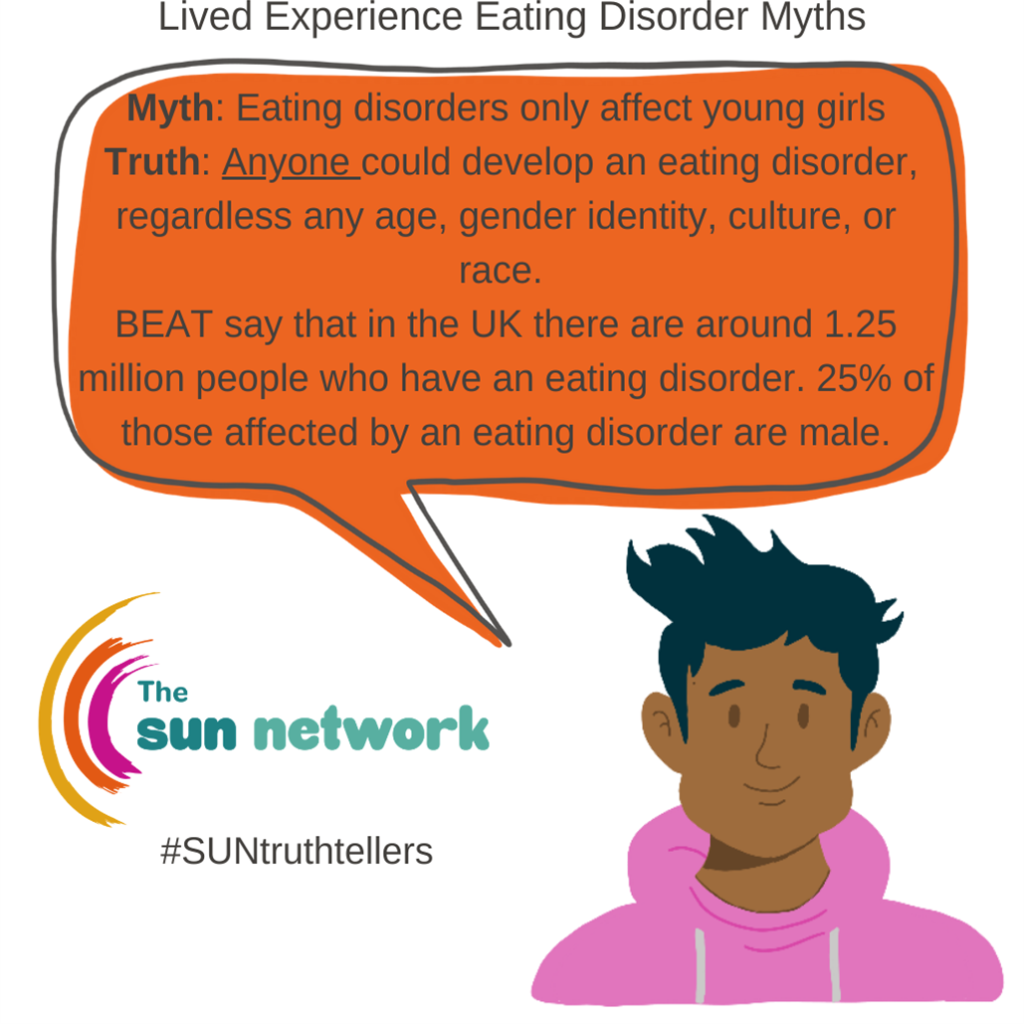
As teachers there are many signs/triggers which it is helpful to be aware of;
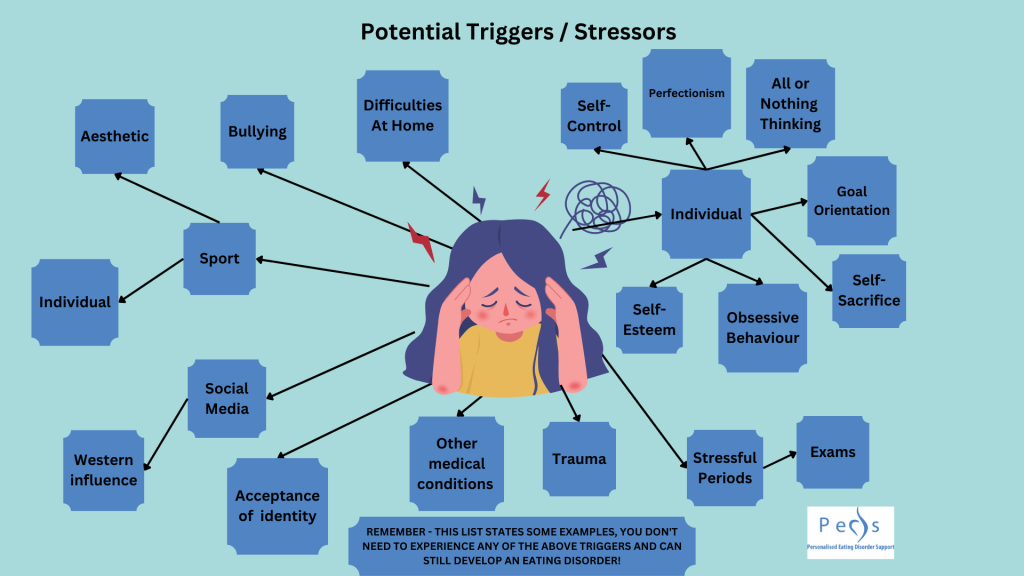
If you notice any of the above or are at all concerned, seek help. Below are some Do’s and Don’ts;
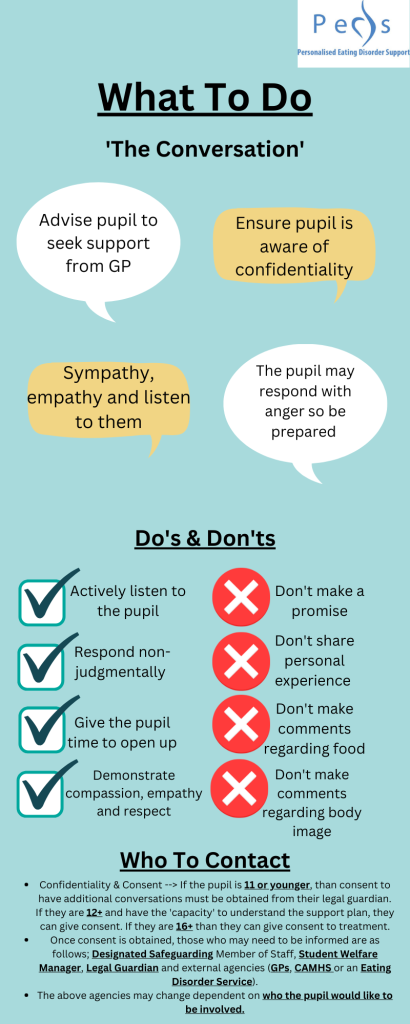
What Not To Say:

Lesson Plan 1
Secondary Teacher’s Guide – Eating Disorders
Student Resource – Truths & Myths
Teacher Answers – Truths & Myths
Teacher Resource – Eating Disorder Quiz
Teacher Presentation – What Are Eating Disorders
Student Resource – Risk of Eating Disorders
Teacher Resource – Risk of Eating Disorders
External Links
PEDS – https://www.pedsupport.co.uk/
SAPHNA Nursing Toolkit- Eating Disorder Toolkit | SAPHNA – School And Public Health Nurses Association
What are eating disorders – Eating Disorders Information Sheet – What are Eating Disorders (health.wa.gov.au)
Starvation Syndrome – Eating Disorders Information Sheet – What is Starvation Syndrome (health.wa.gov.au)
Clean eating when healthy becomes unhealthy – Eating Disorders Information Sheet – Clean Eating (health.wa.gov.au)
Counting calories – Eating Disorders Information Sheet – Counting Calories (health.wa.gov.au)
Unhealthy exercise – Eating Disorders Information Sheet – Unhealthy Exercise
Cambridgeshire PSHE Service KS3 Body Image Cambridgeshire PSHE – Learn Together (cambslearntogether.co.uk)
Dove Self-Esteem Project workshops for schools – Dove
Guide for referring CYP with eating disorders – Healthy London Partnership Partnership
The UK’s Eating Disorder Charity – Beat (beateatingdisorders.org.uk)
FEAST: Support and resources for families affected by eating disorders (feast-ed.org)
What is an eating problem? – Mind – Sections outlining about eating problems, what are eating disorders, causes of eating problems, recovery & self-care, treatment & support, for friends & family, useful resources
Eating disorders | Oxford Health CAMHSOxford Health CAMHS – what eating disorders are, how common are they, signs of an eating disorder. Other sections include information on myths and physical effects of eating disorders
Eating disorders | Mental Health Foundation – Types of eating disorders, symptoms, causes, getting support & what help is available
Eating Disorders & Schools – National Centre for Eating Disorders (eating-disorders.org.uk) – whole school approach, training staff, promoting emotional wellbeing, mental health champion, parental support, targeted interventions, eating disorder, assessment, specialist support in schools for eating disorders, using & up-skilling pastoral staff, guarding staff wellbeing
To request the passcode to gain access to the PEDS Toolkits simply click here: Access
References
Berrettini, Wade. “The Genetics of Eating Disorders.” Psychiatry (Edgmont) 1.3 (2004): 18–25. Print.
Becker AE. Television, disordered eating, and young women in Fiji: negotiating body image and identity during rapid social change. Cult Med Psychiatry. 2004;28(4):533–59. doi: 10.1007/s11013-004-106
Local Support
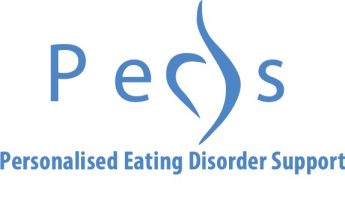
PEDS
Personalised Eating Disorder Support We are a Nurse-led specialist eating disorder charity based in Peterborough, supporting individuals in the Peterborough and Cambridgeshire area. Our charity offers assessment and support with signposting and where appropriate to service users, families and loved ones and professionals. We offer our service users individual sessions which are tailored to meet
Read More About PEDS


